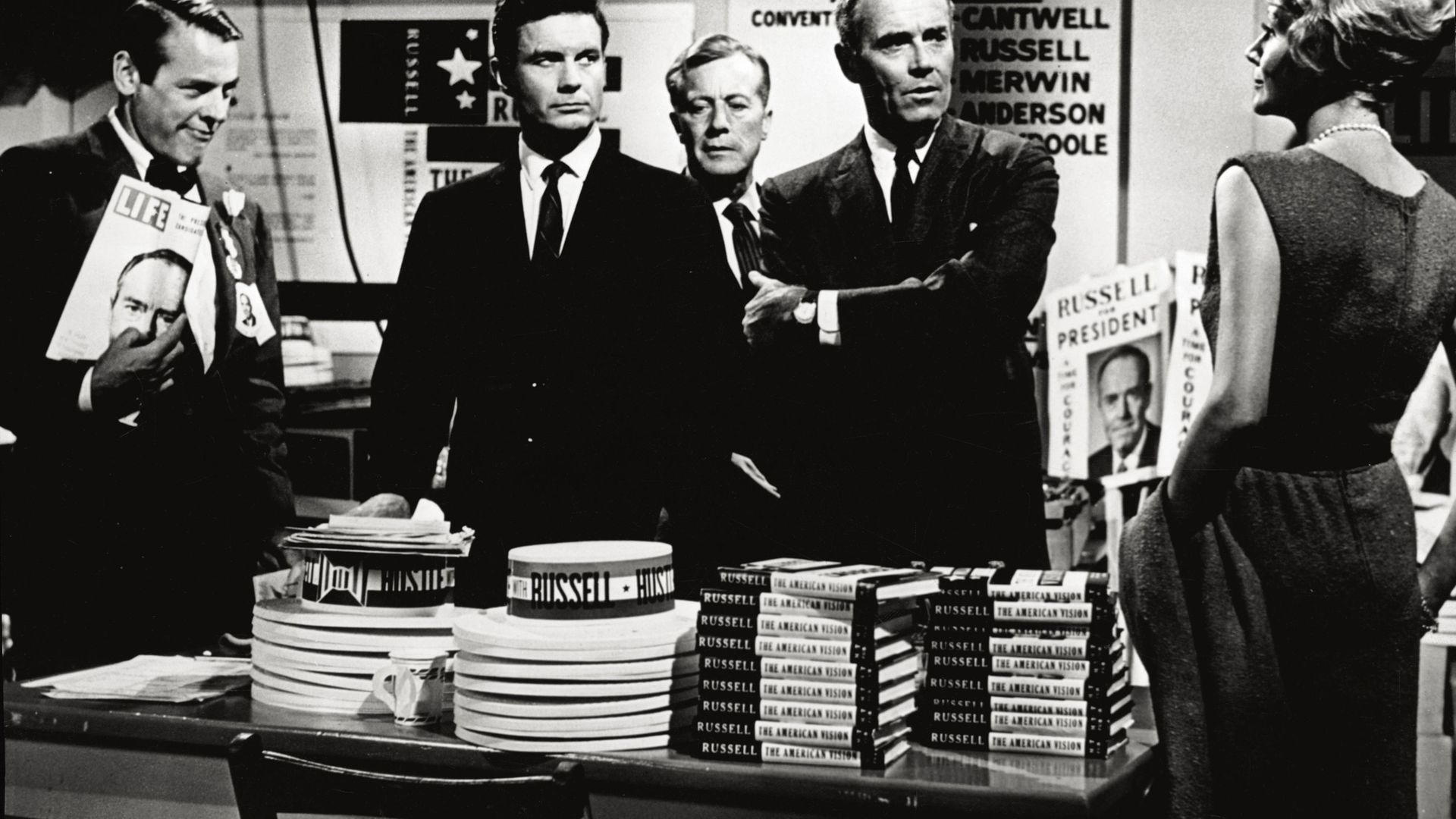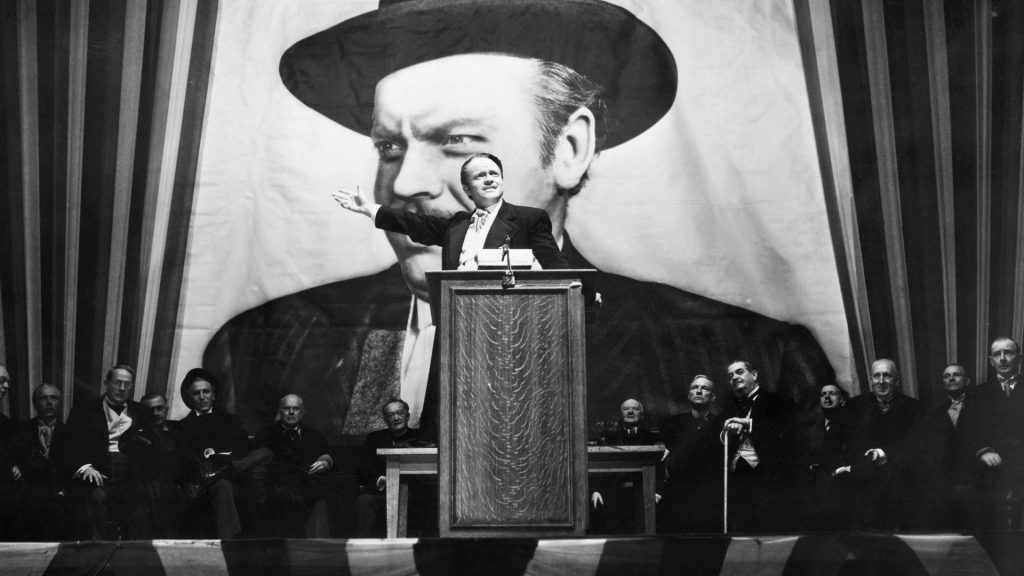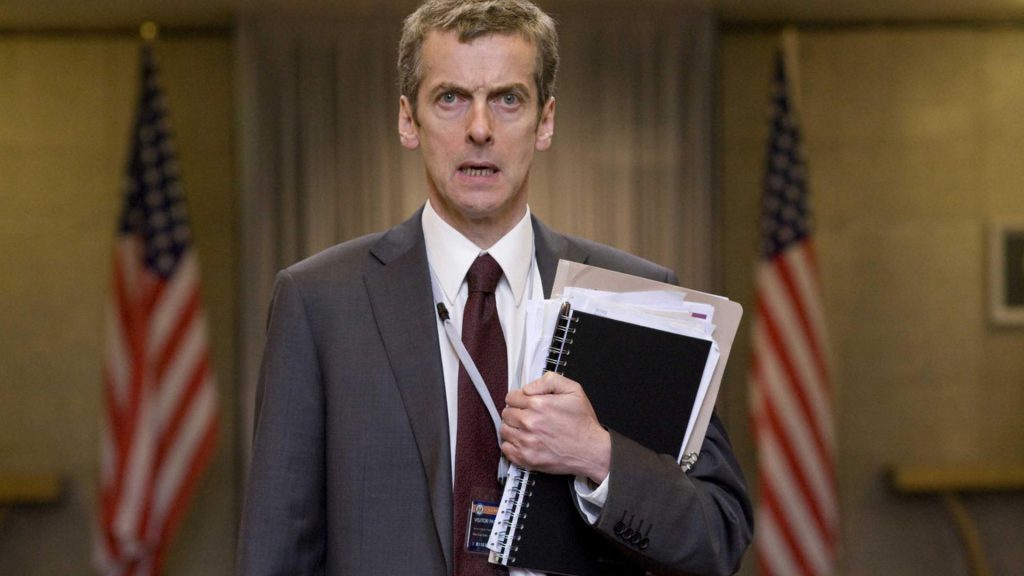
RICHARD LUCK counts down his 20 favourite movies about politics of all time. Which one gets your vote?
20) The Ides of March (2011)
George Clooney not only adapted, produced and directed The Ides of March, he also plays the anchor role of governor Mike Morris, a presidential candidate who’s almost too good to be true. Whenever cracks appear in the Morris veneer, it up to his right-hand man Stephen Meyers (Ryan Gosling) to paper over them. With great supporting performances from Philip Seymour Hoffman, Paul Giamatti, Marisa Tomei and Evan Rachel Wood, The Ides of March might have begun life as a Beau Willimon play but there is little here that’s stagey and an awful lot that’s gripping.
19) Election (1999)
It’s a special film that takes something as dull as a high school election and uses it as way of pointing up the countless problems with democracy in general and American politics in particular. With Reese Witherspoon truly monstrous as overachieving student Tracy Flick and Matthew Broderick wonderfully pathetic as the teacher out to end her reign of terror, the real revelation is American Pie’s Chris Klein as the affable if intellectually malnourished jock who, though he doesn’t know it, is the living embodiment of the good man who lets evil flourish by doing… well, that would spoil it.
18) Planet of the Apes (1969)
As a study of the civil rights situation in the United States, Planet of the Apes isn’t particularly subtle but it does pack a helluva punch. On Pierre Boulle’s La Planète des singes, the gorillas provide the military might, the orang-utans lay down the law and the curious chimpanzees embrace science. And the humans? They are but the voiceless masses whom their brother apes either aid, experiment upon or slaughter in the name of sport. Like I said, subtle it ain’t. Whatever the film’s message, it never gets in the way of the excitement. And as for that ending…
17) Advise & Consent (1962)
There’s mischief written all over this look at the senate confirmation process with director Otto Preminger – who offered key roles to real-life political heavyweights Richard Nixon and Martin Luther King – even daring to set one scene in a gay bar, a locale never before glimpsed in a mainstream movie. Notable for marking the feature debut of Golden Girl Betty White (a mere stripling at 40), Advise & Consent made a big impression on two film-obsessed brothers from Minneapolis, who remade it using their Super-8 camera. Their names? Joel and Ethan Coen.
16) The American President (1995)
No matter the many things there are to love about The West Wing, the show is sufficiently smug and schmaltzy to make seven whole seasons of it hard to swallow. Far better to enjoy the right-on snack that is The American President. Scripted by West Wing creator Aaron Sorkin and starring series regulars Martin Sheen, Anna Deavere Smith and Joshua Malina, this is a film that convinces you the commander-in-chief really does fret about the imminent death of Libyan cleaning staff before ordering the bombing of Tripoli. It also manages to make Michael Douglas seem sympathetic, something that few films have accomplished since Wall Street.
15) La Commune (Paris, 1871) (2000)
In Peter Watkins’ Culloden (1964), a moment from history is brought to life using modern-day media techniques. 2000’s La Commune pulls off a similar trick, with the present and the past and fact and fiction merging to present a lengthy – the director’s cut runs to five hours – but engrossing look at those remarkable months in the spring of 1871 when France appeared set to embrace socialism and atheism. Watkins made the film in part because the Paris Commune is rarely acknowledged by French educators. A better history lesson it’s hard to imagine. Nor a longer one, for that matter.
14) The Parallax View (1974)
The master of 1970s big-screen paranoia, Alan J. Pakula was perfectly placed to scratch the dark underbelly of the period’s politics. For while several films have addressed specific events, here it is the concept of political assassination that is put under the microscope. Many of the nods to real slayings are smartly done: Paula Prentiss’ doomed journalist being inspired by Dorothy Kilgallen, the beloved TV personality who died shortly after interviewing Jack Ruby in jail. Others are refreshingly subtle, such as the glimpse of a girl in a polka dot dress during the slaying atop Seattle’s Space Needle. Meanwhile, leading man Warren Beatty is heroically coiffed throughout.

13) The Ploughman’s Lunch (1983)
Written by Ian McEwan, The Ploughman’s Lunch is serious drama of the highest order. Jonathan Pryce plays James Penfold, a journalist so intent on getting the girl and the gig, he all but ignores the biggest stories of the day – the Falklands War and the presence of US nuclear weapons in Britain. Heck, he’ll even pretend to be a socialist if that’ll kick-start his career and his love life. Though the name Penfold brings to mind investigative journalist Barrie Penrose, The Ploughman’s Lunch is a savage indictment of the fourth estate’s complacency and complicity. Not a pretty picture but a powerful film.
12) Mr Smith Goes To Washington (1939)
Hard to believe it now but Capra’s light political comedy caused quite a stir upon its original release. Watched today Mr Smith comes on like the Hamlet of political movies, which is to say that, even if you’ve never seen the film before, the dialogue and set pieces have been sent-up and homaged with such frequency, the whole thing feels clichéd. And while it’s loosely inspired by the experiences of senator Burton Wheeler, James Stewart’s Jefferson Smith is simply too decent a man to make for a convincing politician. Vote for him? You’d rather put an arm around him.
11) The Best Man (1964)
Another Franklin J. Schaffner movie (he also directed Planet of the Apes), and another stage adaptation. In the case of The Best Man, however, both the play and the adapter are one and the same political bigwig. Indeed, given Gore Vidal’s connections to the Kennedy clan, you don’t have to squint hard to see similarities between the slick but sexually incontinent William Russell (Henry Fonda) and those Kennedy boys. On the other hand, Cliff Robertson’s dour, win-at-all-costs Joe Cantwell is clearly a Nixon clone. As much boxing match as movie, in The Best Man, the jabs are both verbal and they’re jarring: “[He] has all the characteristics of a dog – except loyalty.”
10) In The Loop (2009)
In the 1970s, almost every British sitcom was made into a film. That Man About The House: The Movie didn’t work but this Thick of It reboot works wonderfully in large part due to Malcolm Tucker (Peter Capaldi) being a vast enough figure to thrive on the big-screen. Indeed, it’s thrilling to see ‘The Gorbals Goebbels’ go toe-to-toe with Tony Soprano. But, it’s the things that made the series work that carry the day here, not least a respect for the traditions of sitcom exemplified by Paul Higgins’ Jamie out-Malcolming Malcolm just as David Hyde Pierce’s Niles out-Frasiered Frasier.
9) The Contender (2000)
Former film critic turned director Rod Lurie takes another look at the confirmation process. And while Joan Allen’s senator Hanson seems nailed on for the VP gig, Republican Party reptile Shelly Runyon (Gary Oldman) seizes upon her past sexual indiscretions with glee. An Advise & Consent for an even more cynical age, The Contender might look like a thriller but the satire is never too far from the surface. As for the gags, they’re largely reserved for Jeff Bridges’ Clinton-esque president who’s favourite thing about the job is the fact the White House chef is on call 24 hours a day.
8) All The King’s Men (1949)
‘The Huey Long Story’ in all but name, Robert Rossen’s picture sees the hulking Broderick Crawford deliver a damn fine impression of Louisiana’s infamous ‘Kingfish’, the controversial politician Long. Awarded an Oscar for his efforts, Crawford is so good – and his supporting cast so on-song – you have to wonder why anyone would remake All The King’s Men. Schindler’s List screenwriter Steven Zallian was the man who dared and though his 2006 picture is star-studded (Sean Penn, Kate Winslet, Jude Law), it wouldn’t last five minutes with the original; a film so dark and cynical, you’d never think the prosperous 1950s could be just around the corner.
7) The Candidate (1972)
Top lawyer Bill McKay (Robert Redford) is a man on the move. In his sights, the US senate. If he has all the tools that a modern-day politician requires – looks, charisma, integrity – what he doesn’t have is a hope in hell of winning. Or does he? The story of a hopeless case who threatens the status quo when his message chimes with the public, The Candidate clearly has a lot to say about America’s current predicament. As for the celebrated final scene, you can be sure that something similar took place in Trump Tower on election night 2016.
6) Nixon (1995)
All of Stone’s political pictures have merit (yes, even W.). What makes Nixon stand out is that it’s so even-handed. Balancing out Tricky Dick’s well-documented sins with flashbacks to his horrific childhood and acknowledgement of his foreign policy successes, the film also dares to suggest that, within his marriage at least, the original Milhous could be both loving and considerate. Then just when you think the balance might have swung too far, Ed Harris (as Watergate ‘plumber’ Howard Hunt) sums up the sinister aspect of Nixon in a single, devastating sentence – “He is the darkness, reaching out for the darkness.”
5) Citizen Kane (1941)
True, Charles Foster Kane’s political ambition is but one of the film’s countless subplots but since Welles’ masterpiece is Donald Trump’s favourite movie, it’s interesting to note the similarities between Welles’ media magnate and the 45th president. A young tearaway who has a difficult relationship with his father, Kane inherits his wealth from his mother. In spending it, he reveals twin obsessions with power and status. He trades in his first wife for a young showgirl and when the exposure of said affair sinks his gubernatorial campaign, the billionaire’s papers run the headline “Fraud At Polls”. Add to this Kane’s love of junk food – he has ketchup with everything – and his dismissal of anyone who disagrees with him and you get the impression that Trump doesn’t so much love the movie as he has used it as a playbook, one which has led him to ape Kane’s mistakes as readily as his triumphs.
4) All the President’s Men (1976)
If The Ploughman’s Lunch reveals the cost of the press not doing enough, All the President’s Men explores what investigative journalism can accomplish if it is given time and funding, and is wisely governed. The embodiment of this last factor is Washington Post editor Ben Bradlee, played so well here by Jason Robards that the real Bradlee found himself mimicking some of the fictionalised version’s mannerisms. With next to no fanfare, we see Robert Redford’s Woodward and Dustin Hoffman’s Bernstein actually doing the research and legwork that most press movies consider too dull to cover. In fact, the film as a whole has a muted air; the toppling of Nixon depicted as less a cause for journalistic celebration than the culmination of a job well done. And as the Guardian’s Ali Catterall put it, weighed against modern-day scandals, ATPM resembles “a couple of duty sergeants investigating the theft of some pick ‘n’ mix from Woolworths”.

3) The Mattei Affair (1972)
Enrico Mattei lived many lives. Freedom fighter, businessman, oil magnate, saviour of the Italian energy industry – when you wear that many hats, you’re bound to make plenty of enemies. So it was that when Mattei died in a plane crash, many suspected foul play. Speaking of which, skulduggery also played a role in journalist Mauro De Mauro’s death, the investigation of which – by none other than director Francesco Rosi – forms the subplot of this classic film. Unfortunately, since the material tackled by The Mattei Affair is so explosive, it’s a notoriously difficult picture to get a hold of. If you can track it down, you’ll be richly rewarded. Rosi is that rare filmmaker capable of taking the pulse of his homeland. And at the heart of his Palme d’Or-winning picture? A breathtaking performance from Gian Maria Volonté, to whom there was so much more than his – admittedly superb – spaghetti western bandidos.
2) Z (1969)
A French-Algerian thriller about the murder of a Greek politician, Z hardly has international hit written all over it. But thanks to Costa-Gavras’ assured direction, great performances from Jean-Louis Trintignant and Yves Montand, plus an assist from an English-language dub, the picture went down a storm in the US. While it’s best enjoyed with subtitles, Z’s overseas success is testament to the compelling nature of the story, a fictionalised account of the killing of politician Grigoris Lambrakis. Such controversial subject matter, together with Costa-Gavras’s hostility to the Reign of the Colonels, ensured the one place Z didn’t perform well was Greece, but no matter. The first movie to be nominated for Best Foreign Language Film and Best Picture at the Oscars, Z caused a commotion wherever it was seen. Popular with Latin American resistance groups in the 1980s, there remains an audience for it wherever people feel unheard and unjustly treated.
1) Bob Roberts (1992)
In which Tim Robbins exceeds George Clooney’s Ides of March efforts by composing and performing the soundtrack in addition to serving as writer, director, producer and star. Starting out life as a Saturday Night Live sketch, Bob Roberts is the story of a folk singing Republican millionaire bent on winning a senate seat. To this end, he hires the slippery Chet MacGregor (Ray Wise) to manage his campaign and CIA spook Lukas Hart III (Alan Rickman) to chair it. Roberts also invites a BBC film crew aboard his battle bus, and it is through their eyes that we see how venal American politics has become. Among other things a well-observed send-up of Dylan doc Dont Look Back, Bob Roberts is as funny as it is well-observed (the contender ends a thank you letter to a schoolgirl “PS – Don’t smoke crack. It’s a ghetto drug”), and it really swings when the title character sings (his playlist includes Retake America and We Are Marching). Ultimately, though, this is an incredibly frightening film in which opponents are liquidated and celebrity trumps competence and integrity; integrity being something Tim Robbins has plenty of – unwilling to gift his songs to right-wing talking heads, he refused lucrative offers to issue a soundtrack CD.
Do you agree with the list? Email letters@theneweuropean.co.uk
Warning: Illegal string offset 'link_id' in /mnt/storage/stage/www/wp-includes/bookmark.php on line 357
Notice: Trying to get property 'link_id' of non-object in /mnt/storage/stage/www/wp-includes/bookmark.php on line 37






